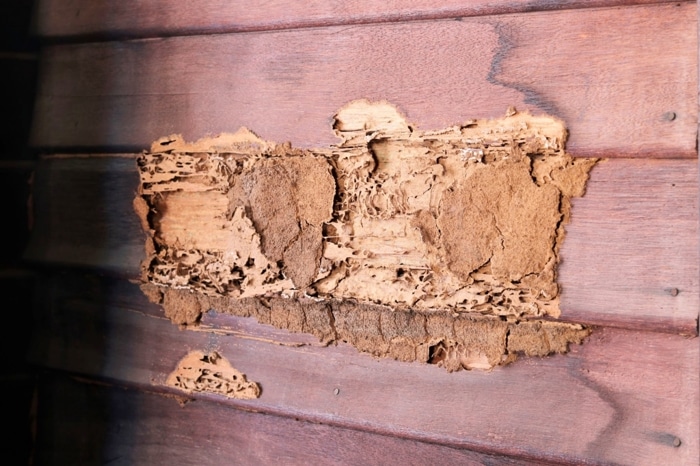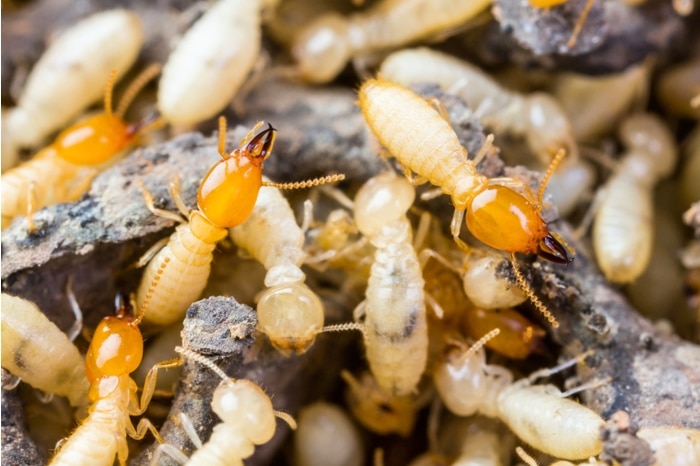with Pest Share!
Discovering termite damage during a real estate transaction can be a nightmare for both buyers and sellers. These hidden invaders can compromise the structural integrity of a property, often going unnoticed until significant damage is done. This guide delves into the intricacies of termite inspections in real estate, particularly who bears the cost – a vital consideration for anyone involved in buying or selling property.
A termite inspection is a detailed examination of a property for signs of termite infestation and damage. These inspections are crucial as termites are often undetectable to the untrained eye, silently causing extensive damage. A professional inspector will check for live termites, evidence of past infestations, and conditions that may attract future infestations, such as wood in contact with soil or moisture problems.
During the inspection, inspectors also focus on termite moisture inspection. This aspect examines areas of the property prone to moisture accumulation, as damp environments provide ideal conditions for termite colonies to thrive. Inspectors use specialised equipment like moisture metres to detect abnormal moisture levels in walls, foundations, and other critical areas, thus identifying potential termite hotspots.
The question of who pays for a termite inspection in a real estate transaction can vary greatly and often depends on local real estate practices, the specifics of the contract, and negotiations between the buyer and seller. Traditionally, it’s common for the seller to bear this cost as part of their responsibility to prove the integrity of the property. However, in a buyer’s market, the buyer may opt to pay for the inspection to expedite the purchase process or as a gesture of good faith.

The decision can also be influenced by state or regional laws. Some regions mandate that the seller provides a termite inspection report before any real estate transaction. Even in areas where it’s not legally required, sellers often take up this cost as a measure of assurance to potential buyers. Real estate agents play a pivotal role in advising clients on the local customs and best practices regarding termite inspection costs.
On the other hand, buyers may choose to pay for the inspection for their peace of mind, especially if they have specific concerns about the property or if it’s located in a high-risk area for termites. For buyers, investing in a termite inspection upfront can potentially save thousands in future repair costs.

Termite moisture inspections form a vital part of the overall termite inspection process. This specialised inspection targets areas in a property that are susceptible to moisture buildup – a condition that attracts termites. Moisture can accumulate due to various reasons, such as poor drainage, leaks, or improper ventilation, creating a perfect habitat for termites.
During a termite moisture inspection, professionals assess the moisture level in various parts of the property using advanced tools. Areas of concern include basements, crawlspaces, around plumbing fixtures, and any wood that is close to or in contact with the ground. The findings of this inspection are crucial because addressing moisture issues can be a key strategy in preventing termite infestations.
This part of the inspection is not just about identifying current termite activity but also about pinpointing potential problem areas that could attract termites in the future. For instance, a property with chronic moisture problems is more likely to face termite issues down the line. Thus, identifying and rectifying these problems can be a significant step in termite prevention.
Both buyers and sellers benefit from a thorough termite moisture inspection. For sellers, it helps in ensuring that their property is in the best possible condition before sale, potentially increasing its value. For buyers, it provides confidence in their investment, knowing that the property is free of both current and potential termite issues.
“Section 1 termite” refers to an essential classification in termite inspection reports. This section identifies active infestations and conditions that have led to direct wood damage. Understanding this terminology is vital for both buyers and sellers as it often signifies urgent issues that require immediate attention.
Section 1 items are generally considered more severe than preventative measures (often classified as Section 2). They typically include active termite infestations, fungal growth in wood due to excess moisture, and wood-to-soil contacts that pose a high risk for termite entry. Identifying these issues is crucial because they can significantly impact the structural integrity of the property and potentially derail real estate transactions if not addressed promptly.
For sellers, addressing Section 1 items before listing the property can greatly enhance the appeal and value of their home. Conversely, buyers must be aware that the presence of Section 1 items could lead to additional negotiations or even reconsideration of the property’s worth.
A termite inspection report is an essential document in the closing process of a real estate transaction. This report provides a detailed account of the inspector’s findings, including the presence of active or past termite infestations, damage caused by these pests, and conditions conducive to future infestations.
The report typically includes a visual representation of the property, highlighting areas of concern, and detailed notes on any findings. It’s not just a tool for uncovering current termite issues; it also acts as a guide for future maintenance to prevent termite problems.
For a real estate deal to proceed smoothly, a clean termite inspection report is often required. Lenders may demand this report before approving a mortgage, as it assures them that the property is a sound investment. For cash transactions, while not always a requirement, it’s still considered a best practice to include a termite inspection report to ensure transparency and trust in the transaction.
Both buyers and sellers have a vested interest in the outcomes of this report. Sellers can use a clean report as a selling point, showcasing their property’s good condition. Buyers, on the other hand, can gain peace of mind or use the report to negotiate repairs or price adjustments if issues are identified.
The negotiation over who pays for the termite inspection is a common aspect of real estate transactions. This negotiation can be influenced by various factors, including local real estate market conditions, the property’s condition, and the terms of the sale agreement.
Typically, sellers might agree to pay for the inspection to demonstrate their commitment to selling a well-maintained property. Offering to cover the inspection cost can be a sign of good faith, indicating that the seller is confident about the condition of their property.
Buyers, particularly in competitive markets or when vying for a property that needs work, might opt to cover the cost themselves. This gesture can make their offer more attractive to the seller, showing earnestness in proceeding with the purchase. Additionally, some buyers prefer to select their own inspector to ensure an independent and unbiased assessment.
Real estate agents play a crucial role in these negotiations. They offer insights into local customs and advise on the best course of action based on current market trends. The outcome of these negotiations can set the tone for the rest of the transaction, impacting how smoothly the process goes.

The decision on who pays for the termite inspection in a real estate transaction often comes down to negotiation between the buyer and seller, influenced by local market conditions and customs. In many cases, the seller may pay for the inspection as part of their responsibility to disclose the condition of the property. However, buyers may also opt to pay, particularly if they wish to expedite the process or have specific concerns about the property.
Understanding local real estate practices and regulations is crucial. Some areas have specific laws dictating who is responsible for pest inspections. Working with knowledgeable real estate agents and pest control professionals can provide valuable guidance in navigating these decisions.
Regardless of who pays, the importance of a thorough termite inspection cannot be overstated. It’s a critical step in ensuring the integrity of the property and can prevent costly repairs in the future. Regular inspections and preventative treatments are key, even after the property changes hands, to maintain a termite-free environment.
Navigating termite inspections in real estate transactions can be complex, but understanding who is typically responsible for the cost and the importance of these inspections can make the process smoother. Whether you’re buying or selling, remember that Pest Share is here to help with expert inspections and treatments. Don’t let termites complicate your real estate journey. Contact Pest Share today for peace of mind in your property transactions.

Pest Share is a technology platform designed to provide affordable pest control to renters across the country.
©2024 Pest Share All Rights reserved. Developed and designed by Pest Share